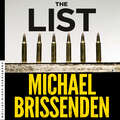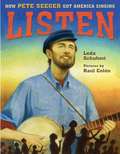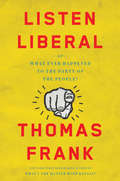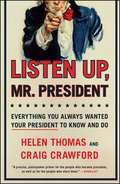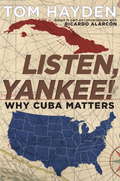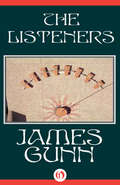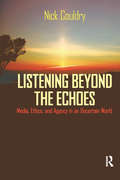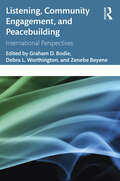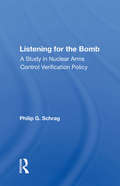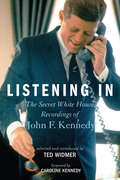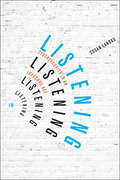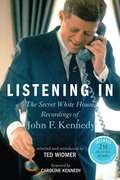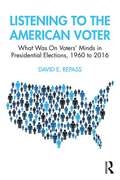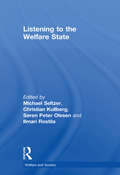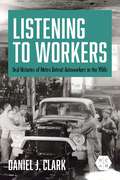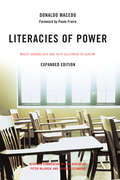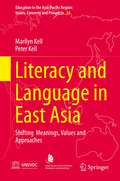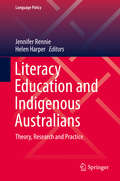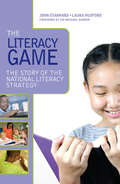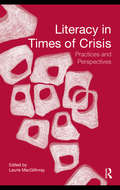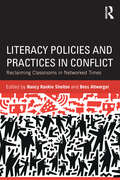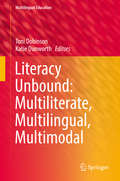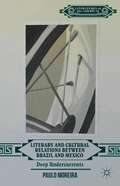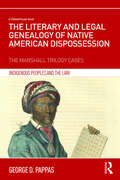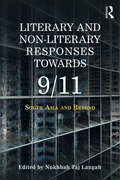- Table View
- List View
The List
by Michael BrissendenSidney Allen is a Fed. Part of the Australian Federal Police's K block, a unit doing whatever it takes in order to stop terrorist attacks on home soil. But when young Muslim men on the Terror Watchlist start turning up dead, Sid and his partner, Haifa, have to work out what's going on. Sectarian war? Drugs? Retribution? <p><p>For Sid, there's nothing unclear about a bullet to the head and a severed hand. Someone is sending a message. Deciphering that message reveals a much wider threat and Sid and the agency have to decide just how far they'll go to prevent a deadly attack. Time is running out ... for them and Australia. From the brutal battlegrounds of Afghanistan, to the western Sydney suburbs and the halls of power in Canberra, THE LIST is a page-turning thriller where justice, revenge and the war on terror collide.
Listen: How Pete Seeger Got America Singing
by Leda SchubertListen.There was nobody like Pete Seeger.Wherever he went, he got people singing. With his head thrown backand his Adam’s apple bouncing,picking his long-necked banjoor strumming his twelve-string guitar,Pete sang old songs,new songs,new words to old songs,and songs he made up.In this gorgeously written and illustrated tribute to legendary musician and activist Pete Seeger, author Leda Schubert highlights major musical events in Mr. Seeger's life as well important moments of his fight against social injustice. From singing sold-out concerts to courageously standing against the McCarthy-era finger-pointing, Pete Seeger's life is celebrated in this bold book for young readers with gorgeous illustrations by Raúl Colón.A Neal Porter BookThis title has Common Core connections.
Listen, Liberal: Or, What Ever Happened to the Party of the People?
by Thomas FrankFrom the bestselling author of What's the Matter With Kansas, a scathing look at the standard-bearers of liberal politics -- a book that asks: what's the matter with Democrats?It is a widespread belief among liberals that if only Democrats can continue to dominate national elections, if only those awful Republicans are beaten into submission, the country will be on the right course. But this is to fundamentally misunderstand the modern Democratic Party. Drawing on years of research and first-hand reporting, Frank points out that the Democrats have done little to advance traditional liberal goals: expanding opportunity, fighting for social justice, and ensuring that workers get a fair deal. Indeed, they have scarcely dented the free-market consensus at all. This is not for lack of opportunity: Democrats have occupied the White House for sixteen of the last twenty-four years, and yet the decline of the middle class has only accelerated. Wall Street gets its bailouts, wages keep falling, and the free-trade deals keep coming. With his trademark sardonic wit and lacerating logic, Frank's Listen, Liberal lays bare the essence of the Democratic Party's philosophy and how it has changed over the years. A form of corporate and cultural elitism has largely eclipsed the party's old working-class commitment, he finds. For certain favored groups, this has meant prosperity. But for the nation as a whole, it is a one-way ticket into the abyss of inequality. In this critical election year, Frank recalls the Democrats to their historic goals-the only way to reverse the ever-deepening rift between the rich and the poor in America.
Listen Up, Mr. President: Everything You Always Wanted Your President to Know and Do
by Helen Thomas Craig CrawfordHelen Thomas has covered the administrations of ten presidents in a career spanning nearly sixty years. She is known for her famous press conference closing line, "Thank you, Mr. President," but here she trades deference for directness. Thomas and veteran journalist Craig Crawford hold nothing back as they use former occupants of the White House to provide a witty, history-rich lesson plan of what it takes to be a good president. Combining sharp observation and dozens of examples from the fi rst presidency through the forty-fourth, the authors outline the qualities, attitudes, and political and personal choices that make for the most successful leaders, and the least. Calvin Coolidge, who hired the fi rst professional speechwriter in the White House, illuminates the importance of choosing words wisely. William Howard Taft, notorious for being so fat he broke his White House bathtub, shows how not to cultivate a strong public image. John F. Kennedy, who could handle the press corps and their questions with aplomb, shows how to establish a rapport with the press and open oneself up to the public. Ronald Reagan, who acknowledged the Iran-Contra affair in a television address, demonstrates how telling hard truths can earn forgiveness and even public trust. By gleaning lessons from past leaders, Thomas and Crawford not only highlight those that future presidents should follow but also pinpoint what Americans should look for and expect in their president. Part history lesson, part presidential primer,Listen Up, Mr. Presidentis smart, entertaining, and exceedingly edifying.
Listen, Yankee!
by Tom HaydenBased on unprecedented access to both Cuban and American officials, a book that offers fresh insight into one of history's most enigmatic relationships between nation-states--from one of America's best-known voices of political and social activism.Listen, Yankee! offers an account of Cuban politics from Tom Hayden's unique position as an observer of Cuba and as a US revolutionary student leader whose efforts to mobilize political change in the US mirrored the radical transformation simultaneously going on in Cuba.Chapters are devoted to the writings of Che Guevara, Régis Debray, and C. Wright Mills; the Cuban missile crisis; the Weather Underground; the assassination of JFK; the strong historical links between Cuba and Africa; the Carter era; the Clinton era; the Cuban Five; Elián González; and the December 17, 2014 declaration of normalization by presidents Obama and Castro.Hayden puts the present moment into historical context, and shows how we're finally finding common ground to the advantage of Cubans and Americans alike. From the Hardcover edition.
The Listeners
by James GunnAfter fifty-one long years of patient waiting, the message has finally arrived. They have dedicated their lives to trying to decipher the eerie silence that resounds from space and now there is finally a sound after decades of quiet. In the beginning there is a hail of celebration--the Project has finally produced results--but then the questions begin. What does the message mean? Could it be 'We come in peace' or 'Get ready for world domination'? The message baffles Earth. Only one man has the power to make the decision and it could mean intergalactic warfare if he makes the wrong choice. Director MacDonald holds in his hands the fate of Earth, the universe and the Project, which is dedicated to answering questions that have plagued humanity for centuries. Will he make the correct choice?
Listening Beyond the Echoes: Media, Ethics, and Agency in an Uncertain World
by Nick CouldryIn this book Nick Couldry, media and cultural theorist from the London School of Economics, asks what are the priorities for media and cultural research today - at a time of the intensified mediation of all fields of social life, threats to democratic legitimacy, and serious instability on the global political stage. The book calls for a "decentered" media research that rejects easy assumptions about media's role in holding societies together and instead looks more critically at the difference media make on the ground to the material conditions of our lives. In what detailed ways do media transform knowledge and agency in daily life? How do media contribute to the culture of democratic politics? And, most difficult of all, how can we live, ethically, with and through media? Couldry's previous work is well known for its breadth, ranging across media sociology, media theory and cultural theory. Here he draws also on political theory and ethics to develop a tightly-argued account of how media and cultural research must now reorient itself if it is to remain relevant and critical. Nick Couldry is Reader in Media, Communications and Culture at the London School of Economics and Political Science. He is the author or editor of five books including Media Rituals: A Critical Approach (Routledge 2003), The Place of Media Power (Routledge 2000) and (coedited with James Curran) Contesting Media Power (Rowman and Littlefield 2003).
Listening, Community Engagement, and Peacebuilding: International Perspectives
by Graham D. Bodie Debra L. Worthington Zenebe BeyeneThis book explores the role of listening in community engagement and peacebuilding efforts, bridging academic research in communication and practical applications for individual and social change. For all their differences, community engagement and peacebuilding efforts share much in common: the need to establish and agree on achievable and measurable goals, the importance of trust, and the need for conflict management, to name but a few. This book presents listening – considered as a multi-disciplinary concept related to but distinct from civility, civic participation, and other social processes – as a primary mechanism for accomplishing these tasks. Individual chapters explore these themes in an array of international contexts, examining topics such as conflict resolution, restorative justice, environmental justice, migrants and refugees, and trauma-informed peacebuilding. The book includes contemporary literature reviews and theoretical insights covering the role of listening as related to individual, social, and governmental efforts to better engage communities and build, maintain, or establish peace in an increasingly divided world. This collection provides invaluable insight to researchers, students, educators, and practitioners in intercultural and international communication, conflict management, peacebuilding, community engagement, and international studies.
Listening For The Bomb: A Study In Nuclear Arms Control Verification Policy
by Philip G. SchragGraham Allison's book Essence of Decision changed the way in which academic analysts think about how governments make major foreign and defense policy decisions.1 Before Allison's book appeared in 1971, even the leading writers on foreign policy tended to describe and explain governmental decisions almost exclusively as if governments were rational human beings making carefully considered choices among available options. This book applies the Allisonian framework to the response of the United States government to a private arms control initiative undertaken in 1986 by the Natural Resources Defense Council, an environmental organization.
Listening In: The Secret White House Recordings of John F. Kennedy
by Caroline Kennedy Ted WidmerIn July 1962, in an effort to preserve an accurate record of Presidential decision-making in a highly charged atmosphere of conflicting viewpoints, strategies and tactics, John F. Kennedy installed hidden recording systems in the Oval Office and in the Cabinet Room. The result is a priceless historical archive comprising some 265 hours of taped material. JFK was elected president when Civil Rights tensions were near the boiling point, and Americans feared a nuclear war. Confronted with complex dilemmas necessitating swift and unprecedented action, President Kennedy engaged in intense discussion and debate with his cabinet members and other advisors. Now, in conjunction with the fiftieth anniversary of the Kennedy presidency, the John F. Kennedy Library and historian Ted Widmer have carefully selected the most compelling and important of these remarkable recordings for release, fully restored and re-mastered onto two 75-minute CDs for the first time. Listening In represents a uniquely unscripted, insider account of a president and his cabinet grappling with the day-to-day business of the White House and guiding the nation through a hazardous era of uncertainty.Accompanied by extensively annotated transcripts of the recordings, and with a foreword by Caroline Kennedy, Listening In delivers the story behind the story in the unguarded words and voices of the decision-makers themselves. Listening In covers watershed events, including the Cuban Missile Crisis, the Space Race, Vietnam, and the arms race, and offers fascinating glimpses into the intellectual methodology of a circumspect president and his brilliant, eclectic brain trust. Just as the unique vision of President John F. Kennedy continues to resonate half a century after his stirring speeches and bold policy decisions, the documentary candor of Listening In imparts a vivid, breathtaking immediacy that will significantly expand our understanding of his time in office.
Listening In: Cybersecurity in an Insecure Age
by Susan LandauA cybersecurity expert and former Google privacy analyst’s urgent call to protect devices and networks against malicious hackers and misinformed policymakers New technologies have provided both incredible convenience and new threats. The same kinds of digital networks that allow you to hail a ride using your smartphone let power grid operators control a country’s electricity—and these personal, corporate, and government systems are all vulnerable. In Ukraine, unknown hackers shut off electricity to nearly 230,000 people for six hours. North Korean hackers destroyed networks at Sony Pictures in retaliation for a film that mocked Kim Jong-un. And Russian cyberattackers leaked Democratic National Committee emails in an attempt to sway a U.S. presidential election. And yet despite such documented risks, government agencies, whose investigations and surveillance are stymied by encryption, push for a weakening of protections. In this accessible and riveting read, Susan Landau makes a compelling case for the need to secure our data, explaining how we must maintain cybersecurity in an insecure age.
Listening In: The Secret White House Recordings of John F. Kennedy
by Ted WidmerIn July 1962, in an effort to preserve an accurate record of Presidential decision-making in a highly charged atmosphere of conflicting viewpoints, strategies and tactics, John F. Kennedy installed hidden recording systems in the Oval Office and in the Cabinet Room. The result is a priceless historical archive comprising some 265 hours of taped material. JFK was elected president when Civil Rights tensions were near the boiling point, and Americans feared a nuclear war. Confronted with complex dilemmas necessitating swift and unprecedented action, President Kennedy engaged in intense discussion and debate with his cabinet members and other advisors. Now, in conjunction with the fiftieth anniversary of the Kennedy presidency, the John F. Kennedy Library and historian Ted Widmer have carefully selected the most compelling and important of these remarkable recordings for release, fully restored and re-mastered onto two 75-minute CDs for the first time. Listening In represents a uniquely unscripted, insider account of a president and his cabinet grappling with the day-to-day business of the White House and guiding the nation through a hazardous era of uncertainty. Accompanied by extensively annotated transcripts of the recordings, and with a foreword by Caroline Kennedy, Listening In delivers the story behind the story in the unguarded words and voices of the decision-makers themselves. Listening In covers watershed events, including the Cuban Missile Crisis, the Space Race, Vietnam, and the arms race, and offers fascinating glimpses into the intellectual methodology of a circumspect president and his brilliant, eclectic brain trust. Just as the unique vision of President John F. Kennedy continues to resonate half a century after his stirring speeches and bold policy decisions, the documentary candor of Listening In imparts a vivid, breathtaking immediacy that will significantly expand our understanding of his time in office.
Listening to the American Voter: What Was On Voters' Minds in Presidential Elections, 1960 to 2016
by David E. RePassThis book explains why elections from 1960 to 2016 came out the way they did. Why did voters choose one candidate over the other and what issues were they concerned with? The answer comes from talking to thousands of voters and analyzing their verbatim responses. Traditional methods used by most political analysts have often led to false interpretations. The book presents a unique model that can predict the vote of 95 percent of respondents. The book also shows that there are two major forces—long-term and short-term—that can explain the overall results of an election. In addition, the author finds a new, highly reliable way to measure the ideological composition of the American electorate. Appropriate for students of American government and informed citizens as well, this book is a revolution in the study of electoral behavior.
Listening to the Welfare State (Welfare and Society)
by Michael Seltzer Christian Kullberg Ilmari RostilaListening to the Welfare State presents, for the first time in English, central research findings from recent studies of the welfare systems of Denmark, Norway, Finland and Sweden. The book’s contributors are leading investigators of face-to-face encounters between welfare professionals and clients in these systems. All have collected their data through ethnographic observations as well as taped recordings of these meetings. By subjecting their data to conversation and discourse analyses, these researchers provide a richly detailed empirical picture of the various forms of talk-at-work constituting the core activity of a variety of street-level bureaucracies. Their findings provide a well-rounded body of knowledge about what happens when professionals meet persons seeking financial assistance, child protection, employment, vocational counselling, treatment, rehabilitation and related services. Essential reading for both professional and students, this book will provide a wealth of insights into and understandings of, the micro-level workings of welfare state systems.
Listening to Workers: Oral Histories of Metro Detroit Autoworkers in the 1950s (Working Class in American History)
by Daniel J. ClarkHistorians and readers alike often overlook the everyday experiences of workers. Drawing on years of interviews and archival research, Daniel J. Clark presents the rich, interesting, and sometimes confounding lives of men and women who worked in Detroit-area automotive plants in the 1950s. In their own words, the interviewees frankly discuss personal matters like divorce and poverty alongside recollections of childhood and first jobs, marriage and working women, church and hobbies, and support systems and workplace dangers. Their frequent struggles with unstable jobs and economic insecurity upend notions of the 1950s as a golden age of prosperity while stories of domestic violence and infidelity open a door to intimate aspects of their lives. Taken together, the narratives offer seldom-seen accounts of autoworkers as complex and multidimensional human beings. Compelling and surprising, Listening to Workers foregoes the union-focused strain of labor history to provide ground-level snapshots of a blue-collar world.
Literacies of Power: What Americans Are Not Allowed to Know With New Commentary by Shirley Steinberg, Joe Kincheloe, and Peter McLaren
by Donaldo MacedoLiteracies of Power illustrates the many ways American schools, media, and other social institutions perpetuate ignorance. In this new, expanded edition, Donaldo Macedo shows why so-called common culture literacy is a form of dominant cultural reproduction that undermines independent thought and goes against the best interests of our students. Offering a wide-ranging counterargument, Macedo shows why cultural literacy cannot be restricted to the acquisition of Western heritage values, which sustain an ideology that systematically negates the cultural experiences of many members of society-not only minorities but also anyone who is poor or disenfranchised. Macedo calls on his own experience as a Cape Verdean immigrant from West Africa who had to surmount the barriers imposed by the world's most entrenched monolingual system of higher education. His eloquence in this book is testimony to the very idea that critical thinking and good education are not and must not be culturally or linguistically bounded.A new concluding chapter by the author critically challenges the crucial role of schools in ?the manufacture of consent? for the war in Iraq and the Patriot Act, and the ?charitable racism? that is too often evident in the field of ESL. In essays new to this edition, well-known and respected educators Joe Kincheloe, Peter McLaren, and Shirley Steinberg share their insights on Macedo's message, complementing Paulo Freire's Foreword to the original edition.
Literacy and Language in East Asia: Shifting Meanings, Values and Approaches
by Peter Kell Marilyn KellThis book critically explores why some Asian nations are on top of the world in students' achievement tests in reading and literacy, yet governments and industry in these nations are anxious about a crisis in education. Why are governments anxious about the capabilities and skills of school and university graduates in a global economy when there is a Asian economic boom? The authors explore questions about how the Asian countries value test-based examination curriculum and its influence on the practices of teaching learning and the lives of young people in Asia. The authors describe the challenge of change for East Asian nations to develop more relevant approaches to literacy and language and more inclusive societies focussed on the needs of young people and not exam results.
Literacy Education and Indigenous Australians: Theory, Research and Practice (Language Policy #19)
by Jennifer Rennie Helen HarperThis edited volume brings together diverse perspectives on Australian literacy education for Indigenous peoples, highlighting numerous educational approaches, ideologies and aspirations. The Australian Indigenous context presents unique challenges for educators working across the continent in settings ranging from urban to remote, and with various social and language groups. Accordingly, one of the book’s main goals is to foster dialogue between researchers and practitioners working in these contexts, and who have vastly different theoretical and ideological perspectives. It offers a valuable resource for academics and teachers of Indigenous students who are interested in literacy-focused research, and complements scholarship on literacy education in comparable Indigenous settings internationally.
The Literacy Game: The Story of The National Literacy Strategy
by Laura Huxford John StannardContaining invaluable insights from the original director of the National Literary Strategy (NLS) and its director of training, this book provides the only systematic exploration of the reform programme. A vital introduction and critical appraisal for pracititioners and students, The Literacy Game examines the origins, evolution and impact of the NLS, and provides a fully comprehensive contribution to the teaching of literacy and the management of educational change. This illuminating text: sets out the political background and context to literacy education in England over a decade from 1996 to 2006 explains and appraises the rationale and design underpinning the NLS, thereby rebutting some of the folk-lore that has built up around it provides an example of the principles and practices of large-scale system change links the NLS to wider global research on system change and educational reform evaluates the contribution of the NLS in advancing knowledge of the literacy curriculum in English and the development of pedagogy as a whole considers the impact and consequences of the NLS on standards of literacy. The Literacy Game is an enlightening book which will appeal to all policy makers and academics who are keen to know what did and did not work in the NLS and why.
Literacy in Times of Crisis: Practices and Perspectives
by Laurie MacGillivray"Fresh, provocative, timely, and important, this volume extends the field of sociocultural literacies in new directions."--Marjorie Faulstich Orellana, University of California, Los Angeles On the frontline of critical issues in education today, this book covers new ground for teachers and teacher educators for whom crisis is a daily part of their work. It explores the relationship between crisis and literacy in order to: improve educators’ ability to recognize, cope with, and avoid crisis; advance understanding of the dynamic relationship between crisis and cultural, historical, and political literacy practices; and contribute to a deeper theoretical understanding of literacy practices as they are situated in social practices. The types of crises addressed are diverse, including natural disaster, cultural and community disjuncture, homelessness, family upheaval, teen pregnancy, and disability. Along with nine empirical studies, a teacher early in her career, a veteran teacher, and teacher educators share their perspectives in commentary sections at the opening and conclusion of the book in order to provide applications to their specific fields.
Literacy Policies and Practices in Conflict: Reclaiming Classrooms in Networked Times
by Nancy Rankie Shelton Bess AltwergerCurrent U.S. school reform efforts link school success, student achievement, and teacher performance to standardized tests and narrowly prescribed curricula. How do test-driven, mandated curricula in urban school systems overtly and subtly impact teachers’ efforts to provide technologically advanced, challenging classroom environments that foster literacy development for all students? How do these federal policies affect instruction at the classroom level? The premise of this book is that, in order for teachers to confront and/or counteract the pressures placed on them from these policies, it is necessary to first understand them. This book takes a close look at the tensions that exist between federal mandates and contemporary literacy needs and how those tensions impact classroom practices. Providing a clear sociopolitical overview and analysis, it combines theoretical explanations with examples from current ethnographic research. Readers are challenged to (re)consider whether meeting test performance benchmarks should be the hallmark of school success when the goal of test performance supersedes the goal of producing highly literate, productive citizens of the future.
Literacy Unbound: Multiliterate, Multilingual, Multimodal (Multilingual Education #30)
by Katie Dunworth Toni DobinsonThis volume promotes a thought-provoking discussion on contemporary issues surrounding the teaching of language and literacy based on first hand experiences and research. Drawing on the authors’ experiences as teacher educators, language and literacy teachers, and researchers on literacy issues it brings together the multiple traditions. What makes the proposed volume unique is the common theme that runs through all the chapters: the examination of the term literacy, the complexity of this term and the importance of having a wide understanding of what it is before tackling educational issues of pedagogy, assessment and student engagement. What is more, as the editors argue, it is necessary to join up the dots and explore the commonalities that form the core of the literacy spectrum.
Literary And Cultural Relations Between Brazil And Mexico
by Paulo MoreiraJoining a timely conversation within the field of intra-American literature, this study takes a fresh look at Latin America by locating fragments and making evident the mostly untold story of horizontal (south-south) contacts across a multilingual, multicultural continent.
The Literary and Legal Genealogy of Native American Dispossession: The Marshall Trilogy Cases (Indigenous Peoples and the Law)
by George D PappasThe Literary and Legal Genealogy of Native American Dispossession offers a unique interpretation of how literary and public discourses influenced three U.S. Supreme Court Rulings written by Chief Justice John Marshall with respect to Native Americans. These cases, Johnson v. M’Intosh (1823), Cherokee Nation v. Georgia (1831) and Worcester v. Georgia (1832), collectively known as the Marshall Trilogy, have formed the legal basis for the dispossession of indigenous populations throughout the Commonwealth. The Trilogy cases are usually approached as ‘pure’ legal judgments. This book maintains, however, that it was the literary and public discourses from the early sixteenth through to the early nineteenth centuries that established a discursive tradition which, in part, transformed the American Indians from owners to ‘mere occupants’ of their land. Exploring the literary genesis of Marshall’s judgments, George Pappas draws on the work of Michel Foucault, Edward Said and Homi Bhabha, to analyse how these formative U.S. Supreme Court rulings blurred the distinction between literature and law.
Literary and Non-literary Responses Towards 9/11: South Asia and Beyond
by Nukhbah Taj LangahThis book presents a range of analytical responses towards 9/11 through a critical review of literary, non-literary and cultural representations. The contributors examine the ways in which this event has shaped and complicated the relationship between various national and religious identities in contemporary world history. Unlike earlier studies on the topic, this work reconciles both eclectic and pragmatic approaches by analyzing the stereotypes of nationhood and identities while also questioning theoretical concepts in the context of the latest political developments. The chapters focus on discourses, themes, imagery and symbolism from across fiction and non-fiction, films, art, music, and political, literary and artistic movements. The volume addresses complexities arising within different local contexts (e.g., Hunza and state development); surveys broader frameworks in South Asia (representations of Muslims in Bollywood films); and gauges international impact (U.S. drone attacks in Islamic countries; treatment meted out to Muslims in Europe). It also connects these with relevant theories (e.g., Orientalism) and policy perspectives (e.g., Patriotic Act). The authors further discuss the consequences for minorities and marginalization, cultural relativism vs. ethnocentrism, the clash of civilizations, fundamentalism, Islamization and post-9/11 ‘Islamophobia’. This book will be useful to scholars and researchers of South Asian literature, Islamic studies, literary criticism, political sociology, anthropology and cultural studies, those in the media and the general reader.
